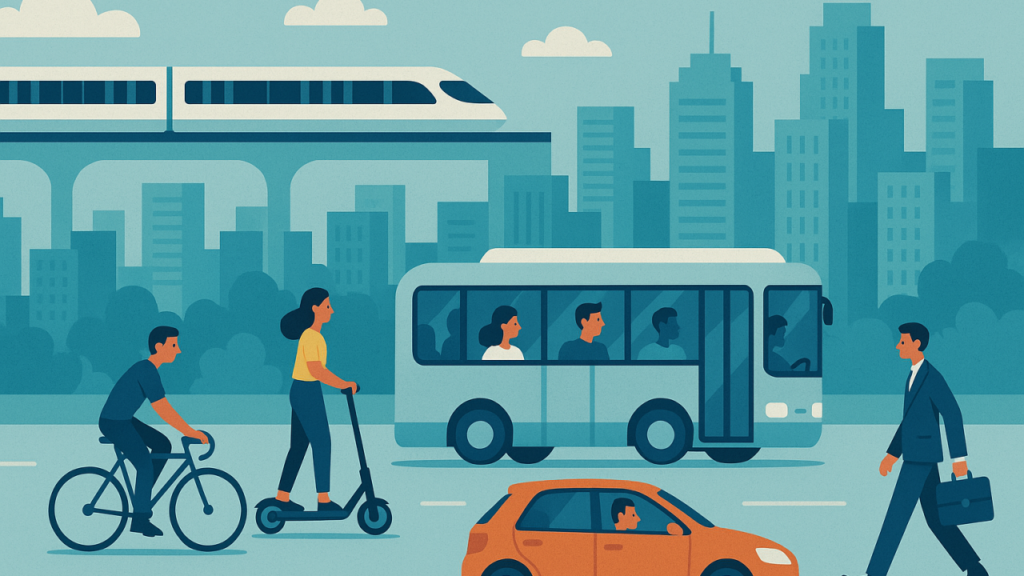
In a city as compact and well-connected as Singapore, it might seem logical to assume that most people rely on public transport to get around. But recent data paints a more nuanced picture—one that offers deep insight into the daily lives, values, and habits of Singaporeans.
Budget Direct Insurance recently conducted a nationwide survey on commuting patterns in Singapore, and the results are both fascinating and revealing. From preferred modes of travel to the impact of daily commutes on mood and lifestyle choices, the findings go far beyond transport—they tell a story about how we live.
Driving remains king—despite the costs
Singapore’s public transport system is efficient, punctual, and affordable. Yet more than 4 in 10 Singaporeans (42.6%) still prefer to drive themselves.
This preference is notable given the country’s high car ownership costs, including hefty Certificate of Entitlement (COE) fees and ongoing maintenance expenses. Cars in Singapore are a luxury—but for many, they are a luxury worth paying for. Why?
Beyond the comfort and flexibility of private travel, owning a car offers a sense of independence and status—values that resonate strongly with a success-oriented society like Singapore’s. But this comes with trade-offs. Traffic congestion, fuel costs, and limited parking are all common complaints among drivers, highlighting the tension between aspiration and practicality.
Public transport: respected, but resented
While the MRT and bus systems are admired internationally, public transport didn’t top the list of preferred options in the survey. Just 29.4% of respondents regularly use the MRT, and even fewer—12.7%—rely on buses.
What’s stopping more people from going car-free? According to the study, overcrowding, long travel times, and the need for multiple transfers are major pain points. While public transport may be reliable, it’s not always comfortable, especially during peak hours.
The implication is clear: accessibility alone isn’t enough. For public transport to truly rival the car in appeal, it needs to feel less like a daily endurance test and more like a seamless extension of people’s lives.
Time on the road: a major lifestyle factor
Time is the most valuable commodity for modern Singaporeans, and commuting takes up more of it than many might expect. According to the survey, most commuters spend between 30 minutes to 1 hour each way, and more than a quarter endure journeys over an hour long.
That adds up to 10+ hours a week—or more than 500 hours a year—spent in transit. Little wonder then that nearly three-quarters of respondents (74.6%) said commuting affects their mood.
Even more striking is this stat: 67% would consider moving house or changing jobs to cut down on their commute. This reveals just how much Singaporeans value time and balance in their daily routines—and how deeply commuting influences lifestyle decisions.
Remote work is changing the game
Although the survey doesn’t focus heavily on flexible work, the current commuting landscape can’t be separated from post-pandemic shifts. Hybrid and remote work options have altered when and how people travel, reducing pressure on public systems and empowering workers to rethink how they spend their day.
As flexible arrangements become more widespread, we may see a corresponding shift in housing, job selection, and even transport infrastructure planning. Commuting is no longer a given—it’s a choice that more people are actively questioning.
What does this say about Singaporeans?
The numbers are important, but so are the stories they tell. Singapore’s commuting habits aren’t just about travel—they’re a reflection of deeper social and personal priorities.
- Autonomy is highly valued. Whether it’s owning a car or switching jobs for a shorter commute, Singaporeans seek control over how they move through life.
- Wellbeing matters more than ever. Commuting isn’t just a physical journey—it’s an emotional and mental one. Long, stressful trips can chip away at quality of life.
- Convenience is key. Even with great public infrastructure, people will gravitate toward whatever saves time and reduces friction.
- Pragmatism defines decisions. Singaporeans are balancing cost, comfort, and practicality in their daily transport choices—a delicate trade-off with real-world impacts.
Moving forward
The findings from Budget Direct’s research suggest that Singapore’s transport system—while impressive—still faces challenges in meeting evolving commuter expectations. As citizens place increasing emphasis on wellbeing, time efficiency, and flexibility, policymakers and urban planners will need to keep pace.
From redesigning residential hubs around transport nodes to improving the in-transit experience on trains and buses, the future of commuting in Singapore will hinge on innovation that puts people first.
You can explore the full study and statistics by visiting Budget Direct Singapore